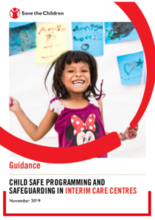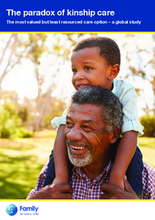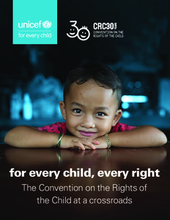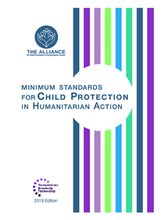Displaying 1781 - 1790 of 4424
This book draws together for the first time some of the most important international policy practice and research relating to education in out-of-home care.
A World Without Orphans original animation. Find out more at: www.worldwithoutorphans.org
In this article for Forbes, Christine Ro describes how "orphanages are the main cause of the unnecessary separation of children from their families" and discusses the recent launch of Lumos' #HelpingNotHelping campaign which calls for an end to orphanage volunteering.
This document outlines some of the potential risks children face in Interim Care Centres and suggests how to manage them to ensure that children are as safe as possible.
This report from Family for Every Child examines the growing use of kinship care, including its value and support needs for safe and effective use. The report argues that there is an urgent need to increase support to children living with relatives or friends of their family, with key recommendations made for national governments, donors and UN agencies.
Published in connection with the 30th anniversary of the Convention, this report is intended as an advocacy tool to both celebrate the achievements of the past three decades and generate dialogue on the critical work that remains – especially for children who have been left behind.
This review aimed to compare child safety assessment instruments, which are used by child welfare professionals to determine whether a child is in immediate danger, and subsequently, whether immediate action is required to stop or prevent serious harm to the child.
The Minimum Standards for Child Protection in Humanitarian Action (CPMS), originally launched in 2012, set out a common agreement on what needs to be achieved in order for child protection in humanitarian settings to be of adequate quality. Years of implementing the CPMS in diverse settings revealed the need for a more user-friendly version of the Standards that would reflect recent sector learning and evidence; improve guidance on prevention, gender and age inclusion, and other cross-cutting themes; and promote applicability to a broader range of humanitarian contexts. Therefore, the Standards were updated in 2019 through a two-year revision process.
This webinar - presented by the Kenya Society of Care Leavers (KESCA), the Uganda Care Leavers (UCL), The Better Care Network and Changing the Way We Care - offered policy makers, practitioners, advocates and careleavers a unique opportunity to listen and learn from two leaders of careleaver associations who highlighted two recent documents that illustrate the careleaver experience within and outside of care.
The International Forum for Volunteering in Development has launched the Global Standard for Volunteering for Development, which will support organizations that work with volunteers to improve their practice and their impact.




